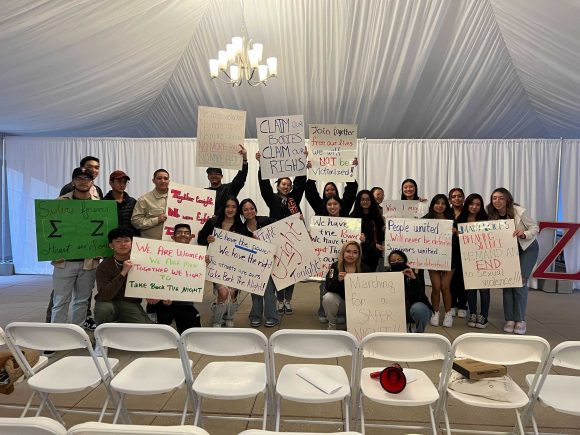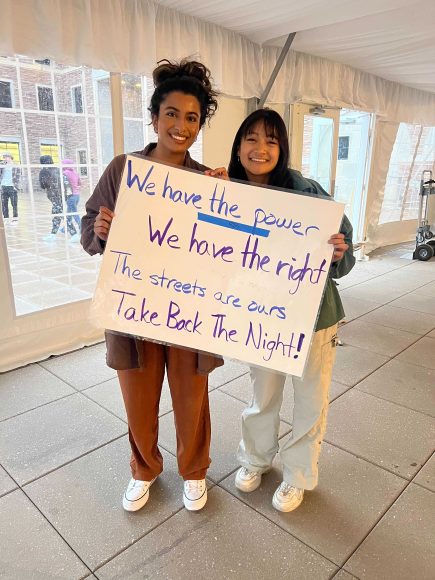
Members of the Sigma Psi Zeta sorority and other attendees hold up signs at a Take Back the Night event on April 27. (Jessi Sachs/CU Independent)
On April 27, the University of Colorado Boulder’s multicultural sorority Sigma Psi Zeta and student activist group Students Against Campus Sexual Assault (SACSA) hosted “Take Back the Night,” an event dedicated to raising awareness about sexual assault and domestic violence on college campuses.
“As a Greek organization on a college campus, we as sisters believe anyone, regardless of race, sex and status, should be able to walk the streets without the constant worry for their safety,” said Bhawana Paudel, a member of Sigma Psi Zeta.
“Take Back the Night” first began in 1972 when women at the University of Southern Florida, dressed in black sheets and holding witches’ brooms, marched across campus to demand resources and support for victims of sexual assault. Over the past 60 years, the movement has continued to expand to college campus and local communities across the world.
At CU Boulder, the “Take Back the Night” event featured multiple guest speakers, who discussed their own personal experiences with sexual assault and how it impacts the campus community. The event also included a candlelight vigil and a moment of silence to honor those impacted by sexual assault and domestic violence.
Initially, the event organizers planned to hold a march in honor of sexual assault victims; however, this portion of the evening was canceled due to inclement weather.
“Unfortunately at CU Boulder, sexual assault is a very prevalent issue, and our students and campus community have not been met with the appropriate response,” said Hima Kilaru, a member of SACSA.
The event comes several months after a CU Boulder freshman created a petition asking CU Boulder to expel and punish Anthony “Deuce” Roberson II, a wide receiver committed to the CU Boulder football team who was accused of rape, harassment or sexual assault by at least 14 women during his time in high school and junior college. Roberson is no longer a member of the football team.
“At SACSA, we are hoping that students and our campus community will feel empowered through their advocacy efforts and passion [for] holding our institution accountable,” Kilaru said.

Hima Kilaru (left) and Shreya Shrestha (right) from SACSA pose with a sign at CU Boulder’s Take Back the Night event on April 27. (Jessi Sachs/CU Independent)
The university has a variety of resources to support victims of sexual assault, including the Office of Victim Assistance (OVA).
Diana Dang, a victim advocate counselor at OVA, was one of the evening’s featured speakers. Dang discussed the importance of community building in order to support victims of sexual assault and the need to implement preventative measures to protect students.
“This type of change happens in a space like this,” Dang said. “It can be incredibly powerful and validating to create or find a community that you can lean on when the world seems overwhelming and terrifying, if there’s distrust in institutions.”
The evening concluded with an open mic portion, where audience members shared their stories in a safe environment. This helped to raise awareness and inspire audience members to continue their advocacy.
“[During] events like these, we find power in numbers — not only to help each other through challenging times, but also to bring tangible change,” said Shreya Shrestha, a member of SACSA.
Contact CU Independent Staff Writer Jessi Sachs at jessica.sachs@colorado.edu.
